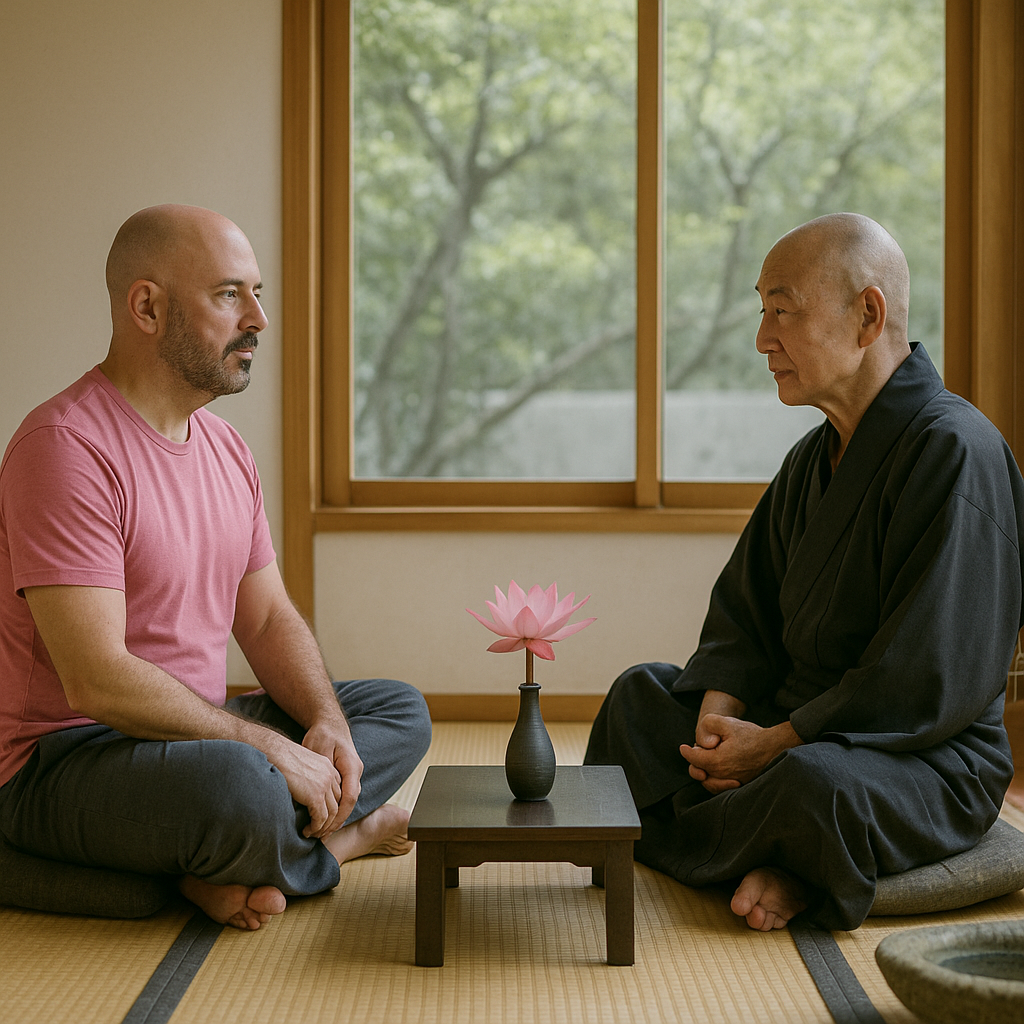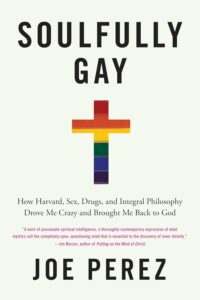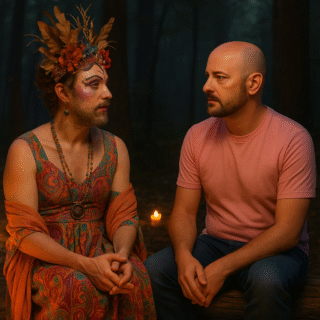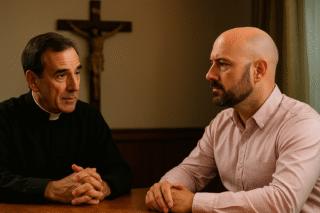
Participants:
- Joe Perez, M.Div. – Author of Soulfully Gay and Nondual Recovery, influencer in the LGBTQ+ community, and teacher of the Unitive Way.
- Roshi Ken’in Gendo – A fictionalized composite Zen master, grounded in a traditional Soto lineage, shaped by monastic discipline and historical Buddhist suspicion of sexuality.
Roshi Ken’in: Thank you for coming. We do not often speak so openly of sex in our temple. You understand, in the Zen tradition, there is a long history of restraint. Desire, especially sexual desire, is like smoke—it clouds the clear mirror.
Joe Perez: I do understand, Roshi. And I honor the depth of discipline in your tradition. But I come to you from a different lineage—not of robes and silence, but of eros and confession. I walk the path I call the Unitive Way, in which desire, properly integrated, becomes a gate to Presence. Even—especially—homosexual desire.
Roshi Ken’in: Hmm. The sages would ask, why stir the fire? We teach not to extinguish the senses, but to see through them. Desire creates clinging. Clinging causes suffering. Is it not enough to see that?
Joe Perez: It is enough—to see that—but not always to stop there. What if desire is not inherently a trap? What if its distortion is a result of repression, not expression? Nondual Recovery, my teachings for persons in recovery from addictions and avoidances, teaches that wholeness does not come from avoiding what arises, but from loving it into presence. When desire is met without shame or indulgence, it becomes a mirror—not a mask.
Roshi Ken’in: The mirror, yes. But desire is sticky. Erotic desire even more so. Historically, we have seen sexuality—especially among monks—as a gateway to delusion. Your homosexuality, then—how do you see it? Not as a deviation?
Joe Perez: No. Not a deviation. A calling. In Soulfully Gay, I received a teaching that I shared on the book’s final page—a vision of something that I call The Cross in the Center of Everything. It revealed to me that homosexuality and heterosexuality are not opposites, not better or worse, but co-equal expressions of love’s unfolding. They are the two directions of the vertical beam of erotic becoming—one moving toward transcendence, the other toward immanence—intersected by a horizontal beam which is our masculine and feminine essences.
Roshi Ken’in: Transcendence and immanence. These are dual words.
Joe Perez: Yes—and also not-two. In the Unitive Way, we speak of the Ascending Current and the Descending Current. Heterosexual eros often moves us toward transcendence: the reaching toward the other. Homosexual eros often moves us toward resonance: the recognition of the self in the other. Both are sacred. The flower does not need to ascend to be complete. It blooms from within.
Roshi Ken’in: But does this not re-center the self? Zen teaches: lose the self, and you find everything. Desire reinforces the illusion.
Joe Perez: Only when desire is unconscious. But when desire is aware, open, held in presence, it no longer re-centers the ego—it unveils the One. When I look upon a man I love—not with grasping, but with reverent openness—I see not only his form, but the radiance within it. That is not ego. That is the Dharma of the body.
Roshi Ken’in: You speak of Presence. But is it not impermanence that sets us free? Presence, too, can become a clinging.
Joe Perez: That’s why Presence must be recognized as self-emptying. In the Unitive Way, Presence is not permanence—it is being-with, the willingness to meet this moment, this body, this breath, without contraction. Gay eros, often shamed and hidden, becomes a doorway—not because of its intensity, but because of its transparency. It teaches us to be here. To stop fleeing. Even in longing, we learn to stay.
Roshi Ken’in: You are bold. You turn what we suppress into sacrament.
Joe Perez: Perhaps. Or I am merely remembering what was never absent. That God—Reality, Buddha-nature, Christ-consciousness—does not flinch from flesh. In Soulfully Gay II, I say: the descent into the body is the return to God. And for gay people, whose very bodies have been treated as wrong, the act of loving one another in Presence is an act of liberation. Not from desire, but through it.

SPEAKING OF SUFFERING
Roshi Ken’in: You speak of liberation, but also of suffering. In Zen, suffering—dukkha—is our first Noble Truth. It is the fire we learn to sit in, not escape. What is suffering in the Unitive Way?
Joe Perez: That’s a powerful point. In the Unitive Way, suffering is not an error—it is a doorway. Nondual Recovery is rooted in the idea that the path to wholeness begins in the body’s very craving, even addiction. When we bring awareness into our suffering—when we sit with the urge to numb, to flee, to consume—we discover that presence itself begins to unwind the contraction. The suffering doesn’t need to be fixed; it needs to be witnessed.
Roshi Ken’in: So suffering is a koan, in your view.
Joe Perez: Precisely. And for queer people, that koan often includes rejection, shame, and homophobia. In Soulfully Gay, I drew on the Christian mystic Jim Marion, who says in Putting on the Mind of Christ that the homosexual’s path is a cruciform path. We are called not merely to bear suffering, but to allow our suffering to participate in the redemptive action of Christ. Every encounter with exclusion, every internal wound, becomes part of a sanctifying fire. When held in presence, suffering becomes not just purgation, but transformation.
Roshi Ken’in: That is something even Zen might bow to. Transformation without seeking. Just sitting with the wound until it becomes a mirror.
Joe Perez: And in that mirror, the face of Christ. Or Buddha. Or simply Love.
Roshi Ken’in: Then perhaps there is a teaching here. One that rises not in silence alone, but in the body’s willingness to be fully known.
Joe Perez: That is being soulfully gay. That is the Unitive Way.




